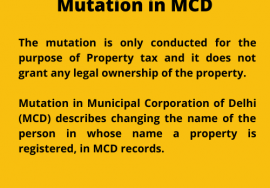
Mutation of Name in L & DO
Mutation of Name in L & DO: Mutation is the change of title ownership from one person to another when the property is sold or transferred. By mutating a property, the new owner gets the title of the property recorded in his/her name in the land revenue department and the government is able to charge property tax from the rightful owner.
One needs to get mutation done and get the new owner details updated in the revenue records maintained by civic bodies like Municipalities, Panchayats or Municipal Corporations.
There are two types of mutations :
- Mutation of Agricultural lands
- Mutation of Non-Agricultural Lands. Examples: Flats, independent houses, residential plots, go-downs, etc.
In the case of Agricultural lands, mutation is a must. Without mutation, the land title will not pass to the new owner. Mutation should be entered in the revenue records
In the case of non-agricultural lands, failure to mutate does not take away your right in the sale deed. That is even though the mutation has not been done, the purchaser’s title will not be affected
Enclose are the required documents along with the application and court fee.
- Application form
- Copy of Sale Deed
- Indemnity Bond & Affidavit
- A latest property tax receipt
Documents required in case of inheritance or Will are as below: In case of death of the owner, mutation/substitution will be required to be done for his legal heirs.
If the owner leaves behind a will, it will be carried out in the name of the beneficiary. However, such a will should have been executed by the owner out of love and affection and not for monetary consideration.
Moreover, the property should not have passed to the beneficiary during the lifetime of the TESTATOR. In such a case no unearned increase will be recoverable.
If the owner dies intestate, that is without leaving a will, then the provisions of the Indian Succession Act, of 1925 will be applicable and his properties will be distributed equally among all his class I legal heirs.
In such case, any legal heir can apply for mutation of the property in their name by submitting the necessary documents
- Application form
- Death Certificate
- Copy of Will or Succession Certificate
- Indemnity bond & Affidavit
- The latest property Tax paid receipt
- Copy of Sale Deed etc.,
On the receival of the application for mutation, it is required to be verified by the concerned authorities whether the transfer has been effected with the lessor’s permission. If so, then the transferee is required to provide a copy of the transfer deed duly attested by the Sub-Registrar’s Office.
On receipt of an application for mutation after the transfer of a property, it shall be verified by the concerned section of the Land and Development Office whether the transfer has been effected with the permission of the lessor if such permission was required to be obtained under the terms of the lease.
If so, the transferee shall be asked to furnish a copy of the transfer deed, duly certified by the Sub-Registrar.
The Sale Deed or Gift Deed will not be referred to the Branch Officer or Legal Officer for scrutinization if the sale permission/gift permission has been executed by the lessee itself.
All the required documents shall be referred to the Branch Officer or Legal Officer for vetting if the execution of the Sale Deed has been furnished through an attorney.
- Attested copy of the death certificate of the lessee issued by the local body.
- Affidavit in the prescribed format of all the legal heirs, duly sworn before a Magistrate/Sub-Judge, if the property is to be substituted in favour of all the legal heirs.
- Certified copy of the Relinquishment Deed duly registered with the Sub-Registrar in whose jurisdiction the property is situated;
- In case one or more legal heirs want to release his/her share in favour of the applicant.
- Copy of the ‘Will’ if any, left by the lessee.
If the application and the documents furnished are in order and there is no dispute about the genuineness of the ‘Will’, then the substitution letter shall be issued to the applicant within the next three months.
Where the genuineness of ‘Will’ is disputed by any of the legal heirs, then the following procedure shall apply in respect of registered or unregistered ‘Will’.
In cases, where the property is to be substituted in favour of one or more legal heirs on the basis of a Will (Registered/Unregistered) the beneficiary/beneficiaries shall be asked to submit an affidavit in the prescribed format, along with the affidavits of all other legal heirs.
Substitution on the basis of court orders or decrees shall be carried out on furnishing by the successor of the property, an attested copy of the death certificate of the lessee and a certified copy of the court order or decree declaring the successor to be the lawful heir to the property.
In case, where the substitution is to be carried out on the basis of the Will, Relinquishment Deed, Court Order, or any other legal document such as a letter of administration, all such documents shall be referred to the Branch Officer/Legal Officer for vetting.
In case of any doubt, the matter shall be referred to the Assistant Legal Advisor by the Branch Officer, with a proper referring note clearly stating the issue of advice.



